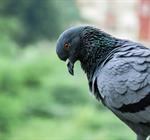29 Dec 2020 | Apex Environmental Services (UK) Ltd
There are many reasons you do not want birds on your property, be it home or business premises:
- Birds can often make a lot of noise. Noise can be annoying when you are trying to sleep or distracting when your workforce is trying to work
- Bird droppings do not look nice and can carry parasites
- Debris from the nests and feathers can clog drains
- Birds may enter the attic and damage the home's insulation
- Bird droppings can corrode metal and concrete
It is likely many creatures will make your building a temporary base for a night or two then fly off to a new home. However, when birds begin to nest in the property, be it your home or place of work, it can become a huge problem.
It is worth determining first why the birds are perching here so you can select an accurate solution. Typically, birds will perch because the location is close to food, water, and shelter from the elements.
Strategically Placed Bird Feeders
If you can catch the situation before it becomes too bad, merely encouraging birds away from the home might be enough. If you have a large garden, placing a bird feeder at the end of the lawn will help draw them away from the building. This can be particularly good if you have trees and other greenery where the birds may find a more suitable home.
Make the Environment Uncomfortable
Irritating lights and wind chimes will create an uncomfortable environment for birds that want to make your house home. These simple hacks will deter birds from perching and nesting on your property.
Netting can also be used as a harmless way of preventing birds from entering the property's grounds. Mesh is an excellent solution to place over vegetable patches where birds may be causing a particular problem.
Scare Them Away
When done properly, placing a scare in the garden can be effective in deterring birds from perching. However, this is often rendered ineffective as the item must be scary enough to force the pests to leave their newfound warm, comfortable environment with access to food and water. Scare owls can be purchased but must be used before the perching and nesting become a huge issue for them to be effective.
Be aware that birds are not stupid. They will quickly realise that a strategically placed owl or scarecrow hasn't bothered them in weeks. Birds can quickly become immune, realising the scare tactic poses no threat to their family.
For a more effective scare, you could consider investing in hawking. Birds are incredibly protective over their young, and when they see a predatory bird will often decide to move their nest elsewhere to avoid danger. Investing in a hawking programme aims to not only deter the birds from perching and nesting but prevent them from returning to the property altogether. Hawking programs are often used in conjunction with other scaring tactics such as kites.
Bird Spikes
Spikes are a permanent, cost-effective way of preventing birds from nesting on your building. Spikes are also an excellent option for placing along fencing to deter birds from perching.
Many people are often worried about bird spikes as they see them as an inhumane option.
This is not the case, as the spikes simply deter the birds from resting there. Bird spikes are handy for on top of buildings, where birds choose to make their home as they cannot be chased away. Spikes make it impossible for birds to perch or build a nest.
This is a great option for those on a budget, as they are a simple one-off payment that will indeed prevent birds from perching on your property.
Seal Off the Access
Birds may likely be using your roof to access a warm and comfortable attic. Birds in the attic can not only cause a severe mess and disturbance but can cause serious damage to your insulation.
If possible, seal the chimney and inspect the roof to discover any other areas the birds may be using to access your property.
Remove the Attractions
Think about what is attracting the birds to your property. Any bird feeders close to the home might be causing the creatures to congregate.
It is worthwhile to consider whether your garden or roof provides the birds with a cosy, comfortable home. Loose branches and leaves make it easy for birds to set up home and nest on your property. Removing these items is a simple trick to deter birds from settling.
Are you unknowingly supplying the animals with a food source? Fruit plants and trees may be attracting them. Another draw is litter. This might not mean your garden is scattered with rubbish, but a slightly left open bin may be providing the animals with a regular dinner time feed. Ensure patio furniture and barbeques that are left outside are also clean; the smallest crumbs and scraps of food will encourage birds to your home.
Also, make sure you are not leaving any pet food bowls outside or traces of pet food. This will be an easy and regular food source for birds and encourage them to perch, and nest on your property.
Water features in the garden also often attract animals. However, this does not mean you have to remove the feature altogether. Consider switching from freshwater to saltwater in order to prevent any birds from making your house home.
Final Thoughts on Deterring Bird Perching
How to deter birds will inevitably boil down to whether you are working from a residential or business premises. Making an uncomfortable environment for the creatures will likely be sufficient to prevent or move on the birds from residential buildings.
For bigger buildings, a more significant investment may be necessary. Spikes and meshes are excellent options, offering long term, relatively low-cost solutions to your bird problems. As always, catching the problem early can help prevent more unneeded stresses.
Get in touch with Apex bird control to discuss your options today.
Talk to Apex Bird Control Today
Protecting your buildings from birds requires a bespoke solution. The architecture of the building and your location will have an impact on which species of birds are most likely to pose a risk to your business. By talking to our team, we can help you to identify an effective bird control system.
To find out more today, contact Apex Bird Control now on 01256 578025 or email us at info@apexbirdcontrol.uk


